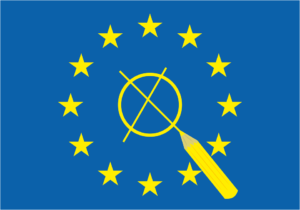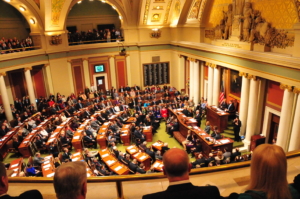The Coming Worldwide Crypto Crackdown
Here’s What You Need To Know
With companies as varied as Eastman Kodak, Long Island Iced Tea, and KFC trying to capitalize on bitcoin, the internet’s best-known cryptocurrency, it appears that bitcoin-mania is reaching new heights. Bitcoin’s journey has been nothing if not volatile, introducing new words into the lexicon like blockchain and raising new policy questions for regulators.
Needless to say, it is worth considering this craze through a regulatory lens, because with every craze comes a crash, followed by the inevitable regulatory crackdown. Here’s our primer on making sense of today’s bitcoin frenzy:
- Blockchain And Bitcoin 101: Blockchain is a technology that allows for the existence of digital mediums of exchange. Like a ledger, blockchain keeps a record of digital, peer-to-peer transactions. It was invented in 2008 to make the launch of bitcoin possible the following year, and has since been used for transactions as varied as legal contracts, “rave” party bookings, and even sexual consent. Although there are over 1,400 different “coins,” bitcoin remains the most popular cryptocurrency, which is a decentralized, virtual form of money that can be used to make purchases without a middleman like a bank or government. Some vendors accepting payments include Overstock.com, Dish Network, Microsoft, and Mark Cuban’s Dallas Mavericks, who will be accepting cryptocurrency next basketball season.
- Where Do Traditional Financial Institutions Stand? Last year, the Commodity Futures Trading Commission approved bitcoin futures and exchanges quickly went live. JP Morgan Chase CEO Jamie Dimon regrets calling bitcoin and other cryptocurrencies a fraud, and has continued to express his belief in the power of blockchain technology, which can be used to transfer non-crypto currencies and disrupt how banking is done. In addition, Goldman Sachs is setting up a cryptocurrency trading desk and making a bet that it can be a portfolio asset comparable to gold. But with a former Wells Fargo CEO calling bitcoin a “pyramid scheme” and Capital One Bank announcing it will block its credit card holders from cryptocurrency purchases, there is no clear message coming from the industry most impacted by this technology.
- Is A Worldwide Crypto Crackdown Coming? It appears the crackdown has already started. The price of bitcoin has plummeted in part due to greater scrutiny of cryptocurrencies like China’s escalated crackdown on online platforms and mobile apps that offer exchange services, and South Korea’s suggestion it may ban cryptocurrency trading. A director at Germany’s central bank called for regulating cryptocurrencies on a global scale, due to the inherent difficulties of enforcing a virtual, borderless community. While this may be plausible in Europe, where continental-scale approaches to regulation have been implemented, a more global agreement may take years to coalesce, if ever. Still, with the Russian government developing a cryptocurrency in the hope of evading international sanctions and scrutiny, and fears that they could assist the North Koreans in doing the same, further national and multinational regulatory barriers are sure to follow.
- What Could Regulation Look Like In The U.S.? The U.S. government has examinedand implemented rules to stem the use of cryptocurrencies for money laundering and other nefarious purposes. And, the Security and Exchange Commission warned investors to “exercise caution” when it comes to cryptocurrencies because state and federal regulators are still working to get ahead of the issue, meaning that any money lost due to illegal actors in the meantime may not be recovered. Comprehensive regulation would be led by the Federal Reserve, which is responsible for monetary policy, and whose chair said bitcoin plays a “very small role in the payment system,” requiring no regulation at this time. Should cryptocurrencies threaten the Fed’s control of monetary policy in the future, that could quickly change.
Bitcoin’s early success was in part due to its potential for circumvention and lack of oversight, which made it also an ideal tool for criminals. While the above demonstrates the growth beyond that early success, the evidence suggests that further regulatory scrutiny may bring increased volatility. Should this come to pass, it may garner public attention in a way which focuses on the significance of the blockchain revolution more broadly, rather than simply a component of making cryptocurrencies work.
Subscribe to Receive Insights
"*" indicates required fields
News You Can Use
WASHINGTON STATE OUTSOURCES TO ENVIROS
In a recent TL;DR we covered the environmental movement’s efforts in Washington state to push its climate agenda irrespective of law, institutions, and the voters’ will. Since then, it’s been uncovered that Governor Jay Inslee’s administration is acting as a contractor for energy policy work for two nonprofit foundations that push an aggressive climate agenda that ignores market forces.
The state is actually performing a “scope of work” for the two groups in a novel accommodation that raises questions about the influence special interest groups may have on government employees whose policy work they fund, and illustrates further the efforts by activist groups to circumvent the regular legislative process and the institutional accountability it provides.
FILTER BUBBLE FOILS
Is social media making us dumber? Writer Jesse Signal thinks so, citing a recent video clip that went viral in which Harvard professor Steven Pinker referred to people who gravitate to the alt-right movement as “literate, highly intelligent,” and “internet savvy.” His comments predictably drew praise from a neo-Nazi website at the same time he was denounced by a journalist on the left as a “darling” of that movement, even though it was a short clip taken out of context from an eight-minute video in which the liberal, Jewish, Ivy League psychology professor argued against the alt-right’s worldview.
Rather than encourage users to analyze the video clip through the lens of who said it, his background, and whether it represented his complete thoughts, today’s social media “filter bubbles” reinforced instead of informing people’s beliefs, resulting in the disregard of empirical reality.
EXPOSING THE TAX CUT “HYPOCRITE” CHARGE
A common criticism against the recent tax legislation signed into law was that Republicans were hypocritical in supporting tax cuts that increased the deficit, but as with most policy debates, there is more to the issue than a simplistic talking point detached from fact. Mercatus Center Senior Research Strategist Charles Blahous writes that this criticism is premised on a faulty foundational assumption that the current budget projections – increased levels of taxing and spending – are a sustainable baseline.
The tax law both reduces the government’s tax revenue and its spending trajectory, slowing the unsustainable fiscal forecast that Republicans have proposed policies to address and been demonized for in the past. Therefore, while opponents can disagree with the tax law on its merits, calling its proponents “hypocrites” does not stand up to scrutiny.
BERNIE’S BLAST TO THE PAST
You can’t bring a knife to a gunfight, and you also can’t bring old facts to a public policy fight. As it were, Senator Bernie Sanders did the latter when he penned an op-ed in The Guardian about standing together “against powerful special interests” to “eliminate poverty, increase life expectancy and tackle climate change.”
When using facts to make his case, Sanders cited statistics about the number of people living in poverty that are ten and 40 years out of date when compared to the World Bank’s data, undermining his argument and giving credence to the suggestion that his time has passed. So, here’s a rule of thumb for the next generation of political leaders: an information advantage means not only having your facts, but making sure they’re timely and actionable.
CFPB TO FED: NAH, WE GOOD
It is rare if not unprecedented for a federal agency to request zero dollars for its budget, but that is what acting director of the Consumer Financial Protection Bureau (CFPB) Mick Mulvaney did in a recent letter to Federal Reserve Chair Janet Yellen, who funds the special consumer board each fiscal quarter. The CFPB requires about $145 million each quarter to operate.
In a deep dive review of the agency, Mulvaney discovered it had $177.1 million on hand and would not need any additional funds to operate in the second quarter of 2018. While some on the Left may charge that he is trying to shut down the CFPB, Mulvaney’s zero dollar request and the elimination of the Bureau’s “slush fund” go a long way toward making sure the agency is a good steward of taxpayer dollars.



